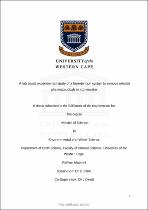| dc.contributor.advisor | Clarke, Sumaya | |
| dc.contributor.author | Maphiri, Refiloe | |
| dc.date.accessioned | 2023-08-11T09:53:58Z | |
| dc.date.available | 2023-08-11T09:53:58Z | |
| dc.date.issued | 2023 | |
| dc.identifier.uri | http://hdl.handle.net/11394/10478 | |
| dc.description | >Magister Scientiae - MSc | en_US |
| dc.description.abstract | The use of treated stormwater as an alternative source of water supply in urban areas is receiving global recognition. This approach is being supported as an innovative initiative that improves urban water security and diversifies urban water demand management options. However, reported toxic pollutants from some land-use activities threaten the quality of stormwater thereby restricting the potential for using stormwater to augment the water supply system. Such reported risks entail the treatment of the stormwater before its use for any purpose. Therefore, this study reports the findings of the research which investigated the effectiveness of a bioretention system in removing pharmaceuticals from stormwater and the influence of retention time and stormwater volumes on the removal efficiency of the pharmaceuticals by the bioretention system. To achieve the objectives of the study, there was a need to identify and measure the concentration levels of the pharmaceuticals found in stormwater. It was also necessary to determine the removal efficiency of the identified pharmaceuticals by using the Turf Grass and Pennisetum plants in a bioretention system with soil media control. | en_US |
| dc.language.iso | en | en_US |
| dc.publisher | University of the Western Cape | en_US |
| dc.subject | Water resources | en_US |
| dc.subject | South Africa | en_US |
| dc.subject | Pharmaceuticals | en_US |
| dc.subject | Wastewater | en_US |
| dc.subject | Drinking water | en_US |
| dc.title | A lab based experimental study of a bioretention system to remove selected pharmaceuticals in stormwater | en_US |
| dc.rights.holder | University of the Western Cape | en_US |

